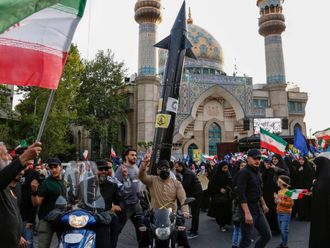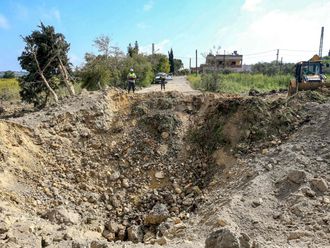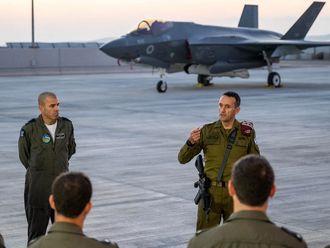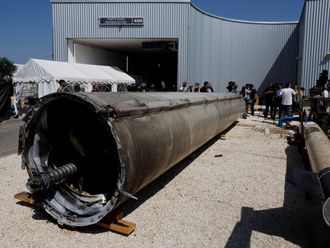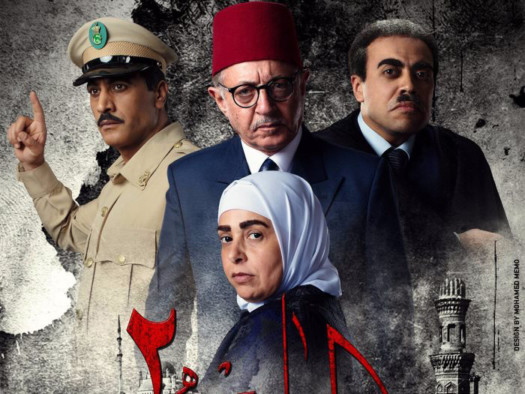
Cairo: Days after the 1952 overthrow of Egypt’s monarchy by young army officers, the supreme guide of the Muslim Brotherhood returns from a seaside holiday and huddles with his aides.
“I decided to go away until it is clear for us who is the loser and who is the winner,” the Brotherhood chief says. “We stand to benefit from joining hands with the winner.”
This is a scene from “Al Jamaa II” (Group II) the second part of an Egyptian epic TV serial dramatising the rise of the Muslim Brotherhood.
The first part, shown in 2010, covered the period from 1928 when Hassan Al Bana founded the Brotherhood until 1949 when he was gunned down in a Cairo street.
“Al Jamaa II” tackles turbulent ties between the Islamist group and Egypt’s new rulers led by Jamal Abdul Nasser, who toppled the monarchy in July 1952.
Based on a screenplay by celebrated Egyptian writer Wahid Hamed, the serial features repeated Brotherhood attempts to impose their agenda on the governing junta, culminating in a violent showdown between the two sides.
But unlike the first part, the second has not drawn direct fire from the now-outlawed Brotherhood. Critical salvos have been fired from others.
Some loyalists of Abdul Nasser lashed out at “Al Jamaa II”, calling it a “distortion of truth”.
They were upset after the drama indicated in early episodes that Abdul Nasser, an iconic leader who ruled Egypt from 1954 until his death, was a member of the Brotherhood early in his life.
“This is an untrue allegation,” said Samy Sharaf, a former secretary of Abdul Nasser.
“Abdul Nasser was not a Brotherhood member. There is a big difference between dealing with the group [Brotherhood] and being one of its members,” Sharaf recently told private Egyptian broadcaster ON TV. “The author of the serial depended on memoirs of the late president’s foes.”
The angry reaction to “Al Jamaa II” did not end there.
Officials in Al Wafd, Egypt’s oldest liberal party, have condemned the series. At the centre of the dispute was a scene in the drama showing Mustafa Al Nahas, a revered Al Wafd leader, kissing the hand of King Farouk after Al Nahas was named to be prime minister following his party’s win in the 1950 elections.
“This incident is fake,” said Fouad Badrawi, a lawmaker and a veteran member of Al Wafd. “The serial narrates events that underestimate a great national symbol like Mustafa Al Nahas,” Badrawi added in a press statement. He said he would file a lawsuit against the makers of the show for alleged twisting of history.
Hamid, the writer of both parts of “Al Jamaa”, defended the show. The 73-year-old writer said he had based his work on “reliable documents”.
“Abdul Nasser is known to have joined the Brotherhood for four years starting from 1944,” Hamid told ON TV. “I think Sami Sharaf was not close to Abdul Nasser at the time.” Hamid also advocated the veracity of Al Nahas’ hand-kissing scene.
“This serial is based on documents and references, including books written by Brotherhood members themselves,” said Wahid, an outspoken critic of the Islamist group.
“I said at the time of the first part [of the serial] and I say it again: If anyone finds a mistake in the series, he can go to the court.”
“Jamaa II” has started showing in Egypt and other Arab countries in the current Muslim holy month of Ramadan when TV viewing reaches its peak.
So far, there has been no comment from the Brotherhood.
However, some sympathisers within the group have assailed the series on social media.
“This serial is part of the rabid campaign targeting the Ikhwan [Brotherhood],” said a man calling himself Saber Al Masri in a Facebook post.
“Its makers depict the Ikwan as devils craving for power while idolising Abdul Nasser despite his catastrophic mistakes. This is cheap propaganda that wastes people’s money and time.”
“Al Jamaa II” stars Egyptian actors Abdul Aziz Makhyoun and Mohammad Faheem, who portray the Brotherhood’s supreme guide Hassan Al Hudeibi and its militant ideologue Sayyed Qotb respectively. Jordanian actor Yasser Al Masri plays Abdul Nasser.
The Brotherhood was banned in 1954 and became the target of a tough crackdown after the group was blamed for a failed attempt on Abdul Nasser’s life.
In 1966, Qotb was executed after he was convicted of involvement in an attempt to topple Abdul Nasser’s government.
The group remained banned until the eruption of the 2011 uprising that forced long-time president Hosni Mubarak out. The Brotherhood won the post-Mubarak parliamentary and presidential elections.
They were removed from power in mid-2013 following massive street protests against their divisive rule.
Months later, Egyptian authorities designated the Brotherhood as a terrorist group after a spate of deadly militant attacks in the country.


